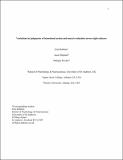Variations in judgments of intentional action and moral evaluation across eight cultures
Abstract
Individuals tend to judge bad side effects as more intentional than good side effects (the Knobe or side-effect effect). Here, we assessed how widespread these findings are by testing eleven adult cohorts of eight highly contrasted cultures on their attributions of intentional action as well as ratings of blame and praise. We found limited generalizability of the original side-effect effect, and even a reversal of the effect in two rural, traditional cultures (Samoa and Vanuatu) where participants were more likely to judge the good side effect as intentional. Three follow-up experiments indicate that this reversal of the side-effect effect is not due to semantics and may be linked to the perception of the status of the protagonist. These results highlight the importance of factoring cultural context in our understanding of moral cognition.
Citation
Robbins , E , Shepard , J & Rochat , P 2017 , ' Variations in judgments of intentional action and moral evaluation across eight cultures ' , Cognition , vol. 164 , pp. 22-30 . https://doi.org/10.1016/j.cognition.2017.02.012
Publication
Cognition
Status
Peer reviewed
ISSN
0010-0277Type
Journal article
Collections
Items in the St Andrews Research Repository are protected by copyright, with all rights reserved, unless otherwise indicated.

